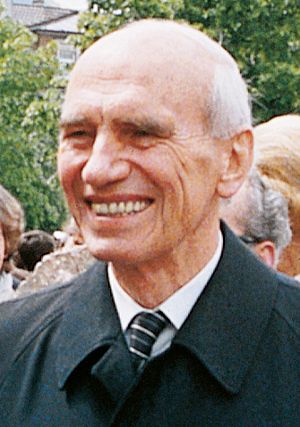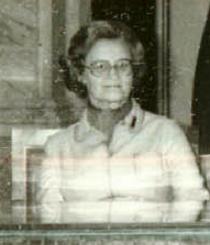Rudolf Kirchschläger facts for kids
Quick facts for kids
Rudolf Kirchschläger
|
|
|---|---|
 |
|
| President of Austria | |
| In office 8 July 1974 – 8 July 1986 |
|
| Chancellor | Bruno Kreisky Fred Sinowatz Franz Vranitzky |
| Preceded by | Franz Jonas |
| Succeeded by | Kurt Waldheim |
| Minister of Foreign Affairs | |
| In office 21 April 1970 – 24 June 1974 |
|
| Chancellor | Bruno Kreisky |
| Preceded by | Kurt Waldheim |
| Succeeded by | Erich Bielka |
| Personal details | |
| Born | 20 March 1915 Niederkappel, Upper Austria, Austro-Hungarian Empire |
| Died | 30 March 2000 (aged 85) Vienna, Austria |
| Spouse | Herma Kirchschläger (1940–2000) |
| Children | 2 |
| Alma mater | University of Vienna (Dr. iur.) |
| Profession |
|
| Signature |  |
Rudolf Kirchschläger (born March 20, 1915 – died March 30, 2000) was an important Austrian diplomat, politician, and judge. He served as the President of Austria from 1974 to 1986.
Contents
Early Life and Education
Rudolf Kirchschläger was born in Niederkappel, a town in Upper Austria. He became an orphan when he was 11 years old. He finished high school in Horn in 1935 with excellent grades.
He then started studying law at the University of Vienna. However, after Austria became part of Germany in 1938 (an event called the Anschluss), he had to stop his studies. He refused to join the Nazi Party, which led to his scholarship being taken away. He could no longer afford his education.
In 1938, Kirchschläger worked as a bank clerk. In the summer of 1939, he was called to serve in the army, the Wehrmacht. He fought as a soldier from the very start of World War II. He was in the invasion of Poland, then on the Western Front, and after 1941, on the Eastern Front against Russia.
In late 1940, he took a two-month break from the army to prepare for his final law exams. He passed these exams and earned his law degree. However, he was sent back to the Eastern Front and was wounded in 1942. By the end of the war, he was a captain and a training officer at a military academy. In April 1945, he was badly wounded in his leg while fighting Soviet troops. He never fully recovered from this injury.
After World War II
After the war ended, Kirchschläger worked as a judge in different towns until 1954. In 1954, he got a chance to work in the Ministry of Foreign Affairs, even though he didn't speak any foreign languages. To help with talks about the Austrian State Treaty, he quickly learned English in just a few months.
From 1967 to 1970, he was Austria's ambassador in Prague. During the Prague Spring (when the Soviet Union invaded Czechoslovakia), he helped Czech citizens who wanted to leave the country. He gave them exit visas, even though he was told not to. From 1970 to 1974, he served as the Minister of Foreign Affairs.
Becoming President of Austria
Rudolf Kirchschläger was elected President of Austria in 1974. He believed in an "ethical foreign policy," meaning that a country's actions with other countries should be based on good values.
In 1974, he granted a pardon to a convicted Austrian war criminal.
In 1980, he was re-elected for a second term. He won with a very high approval rate of 80%, which was the highest ever for an Austrian presidential election. In February 1984, he made the first state visit by an Austrian president to the United States.
Family Life and Passing
Rudolf Kirchschläger was married to Herma Sorger (1916–2009) from August 17, 1940, until his death. They had two children: a daughter named Christa (born 1944) and a son named Walter (born 1947).
Rudolf Kirchschläger passed away from a heart attack on March 30, 2000, near Vienna. He was 85 years old.
Awards and Honours
Rudolf Kirchschläger received many awards from Austria and other countries for his service.
Austrian Honours
 Grand-Cross Order of Merit of the Austrian Republic, Austria (1974)
Grand-Cross Order of Merit of the Austrian Republic, Austria (1974)
Foreign Honours
 Grand-Cross of the Order of Merit of the Italian Republic, Italy (1971)
Grand-Cross of the Order of Merit of the Italian Republic, Italy (1971) Knight of the Order of the Gold Lion of the House of Nassau, House of Nassau (1975)
Knight of the Order of the Gold Lion of the House of Nassau, House of Nassau (1975) Knight of the Collar of the Order of Isabella the Catholic, Spain (1978)
Knight of the Collar of the Order of Isabella the Catholic, Spain (1978) Knight of the Order of the Elephant, Denmark (1979)
Knight of the Order of the Elephant, Denmark (1979) Knight of the Collar of the Order of Charles III, Spain (1979)
Knight of the Collar of the Order of Charles III, Spain (1979) Grand Collar of the Order of Prince Henry, Portugal (1984)
Grand Collar of the Order of Prince Henry, Portugal (1984) Grand-Cross of the Order of Pope Pius IX, Holy See (1990)
Grand-Cross of the Order of Pope Pius IX, Holy See (1990) First Class of the Order of Tomáš Garrigue Masaryk, Czech Republic (1996)
First Class of the Order of Tomáš Garrigue Masaryk, Czech Republic (1996) Knight Grand Cross with Collar of Order of Pope Pius IX, Holy See (2000)
Knight Grand Cross with Collar of Order of Pope Pius IX, Holy See (2000)
See also
 In Spanish: Rudolf Kirchschläger para niños
In Spanish: Rudolf Kirchschläger para niños
 | Percy Lavon Julian |
 | Katherine Johnson |
 | George Washington Carver |
 | Annie Easley |


